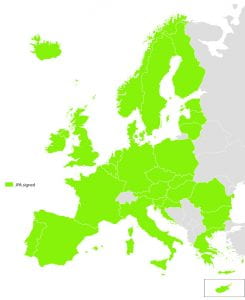By Prof Albert Sanchez-Graells, Professor of Economic Law (University of Bristol Law School).
 Blockchain or, more generally, decentralised ledger technologies (DLTs), are capturing the attention of policymakers. ‘Blockchain’ has become shorthand to refer to technology usually identified with the properties of a decentralised, trustless and immutable (or at least, tamper-proof) mechanism for information verification and recording that can enable self-executing digital transactions between anonymous parties (‘smart contracts’).
Blockchain or, more generally, decentralised ledger technologies (DLTs), are capturing the attention of policymakers. ‘Blockchain’ has become shorthand to refer to technology usually identified with the properties of a decentralised, trustless and immutable (or at least, tamper-proof) mechanism for information verification and recording that can enable self-executing digital transactions between anonymous parties (‘smart contracts’).
Blockchain’s touted tamper-proofness and potential to enable smart contracts are driving initiatives that seek to create automated ‘trust in trustless environments’ for public sector use cases, in particular concerning activities highly-exposed to corruption risks and/or the automation of administrative procedures devoid of discretion.
There are high economic stakes at play in public procurement—which represents around 12% of GDP and over a third of public expenditure in OECD countries, and even higher proportions in other economies. Coupled with the growing (over)reliance of policymakers on business consultants, the hype around blockchain—and, more generally, about public procurement 4.0—is perhaps particularly intense in this field of GovTech and RegTech.
Some legal scholars are rather optimistically jumping on the ‘disruptive technologies bandwagon’ and identifying blockchain as a main tool to increase the probity and efficiency of procurement governance at a national level.1 Some officially-backed ‘visions for the future’ go as far as promising blockchain-supported global e-procurement platforms capable of covering the entirety of procurement transactions carried out worldwide.
This is creating a set of expectations about how blockchain will revolutionise public procurement governance that does not translate into real action. Even further, I submit, blockchain is and will remain structurally inapt to generate such a governance revolution, for several reasons. (more…)






